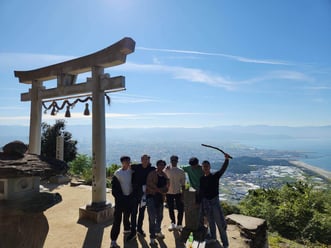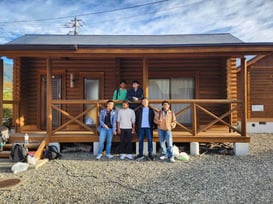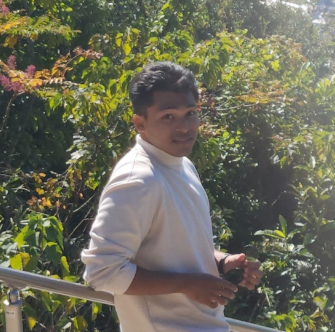Welcome to the Student Voice series. This series interviews students in our English-medium programs. We hope these interviews can be helpful to you when thinking about choosing to come to Ritsumeikan University (RU).
Post by International Admissions Office
Tam from Bangladesh
Information Systems Science and Engineering Course (ISSE)
Mirza Ahmed Ispahani High School
Messing with electronics, cooking, hiking
Why did you choose RU and the ISSE Course?
The ISSE Course, like many university programs in Japan, begins in April. This slight gap in academic calendars allowed me to spend some time at a university in my home country before coming to Ritsumeikan. This experience gave me a fresh perspective and helped me understand better what I was truly looking for in higher education. I realized that I wanted a program where students could regularly earn credits through project-based learning, and ISSE was exactly what I wanted.
At Ritsumeikan, that changed almost immediately. From the first semester, we were introduced to different labs and professors, and we got a sense of the research happening around us. By the second semester, we were already working on a semester-long project. It may not seem significant at first, but it makes a huge difference in the long run.
Most engineering degrees end with graduation research, either in the form of a thesis or a capstone project. What I love about the ISSE Course is that it does not wait until the end to prepare you for that, as you are already gaining project experience from your first year. And I am not just talking about technical knowledge. You also learn how to define a problem, how to approach it, what to do when you are stuck, how to ask for help, and where to look for solutions. These are things you only really learn by doing, and ISSE has given me that opportunity.
In all honesty, one of the things I appreciate most about the ISSE Course is that it constantly challenges you and sometimes makes you feel stuck, and I mean that in a good way. Struggling through a problem, feeling lost for a bit, and then figuring it out is where real learning happens. I was not able to get that back home, and I think that is what sets ISSE apart.
Other than that, I was looking for an international environment where I could interact with people from different backgrounds, and Ritsumeikan, with one of the largest international student populations in Japan, offered just that. Overall, the University checked all the right boxes for me.
About your studies...
Give us an overview of your studies and course schedule from your first year to now.
So far, I have completed most of the fundamental courses and feel that I have built a solid understanding of the basics. Starting this year, we will start moving into more technical subjects, and I believe I have a great deal to learn from them.
If you plan on taking an engineering course, be prepared for the amount of effort it requires, and Ritsumeikan is no exception. In the first few semesters, my days were quite packed because I tried to load up on credits as much as I could. On average, I had two to three courses per day, sometimes even four when I was feeling up for the challenge. That said, credit planning is flexible here, so as long as you can realistically gauge your limits and pace yourself, you will be fine.
The first year mainly focuses on foundational engineering topics, which is typical for most programs. You will go through basic engineering math, physics, and introductory programming. Some students find it easy, others find it tough, and it really depends on your high school background. Personally, I have found the curriculum to be well-balanced. Even now in my third year, I still find myself recalling things I learnt back then.
As for Japanese language studies, I did not take the courses offered by the university. Nevertheless, I was pretty gung-ho to get a JLPT certificate and mostly studied on my own. I also practiced through part-time jobs and tried to immerse myself in as many books and real-world interactions as possible.
In ISSE, students join engineering projects from the first year. Which project(s) did you find the most interesting so far?
 A trip to Kagawa
A trip to KagawaWhat are your plans after graduation? How has your study experience at Ritsumeikan University inspired your future career?
My research interests are quite broad, and that makes it hard for me to commit to a single path. I really enjoy building things, whether it is a project, a tool, or a system that solves a specific problem. That is why I am currently debating between pursuing graduate studies or going straight into a job where I can apply what I have learnt in a hands-on way.
Whichever path I choose, I can definitely say that my time at Ritsumeikan has had a major influence on how I think about my future. Being exposed to so many different labs, professors, and real-world problems has helped shift my perspective. Before, I was interested in technology for the sake of it. Now, I am much more drawn to ideas that can solve real-life issues, even in small ways.
I still do not know exactly what kind of research I want to pursue if I go to grad school, but I am leaning toward fields that combine engineering with social or environmental impact, which is something that is both technically challenging and meaningful. The open and exploratory environment here at Ritsumeikan has helped me get to this point of clarity, even if I have not figured out all the answers yet.
Find out more about the Career Center
About Campus life...
Do you regularly use the cafeterias on campus? If so, what is your favorite dish?
 Camping with friends
Camping with friendsMessage to prospective students
Ritsumeikan offers a variety of courses, so you are sure to find something that fits your interests. The university environment is quite unique because you can choose to put yourself out there as much as you want, in all sorts of academic and extra-curricular activities. If you decide to join, I hope to see you on campus. Come say hi!








